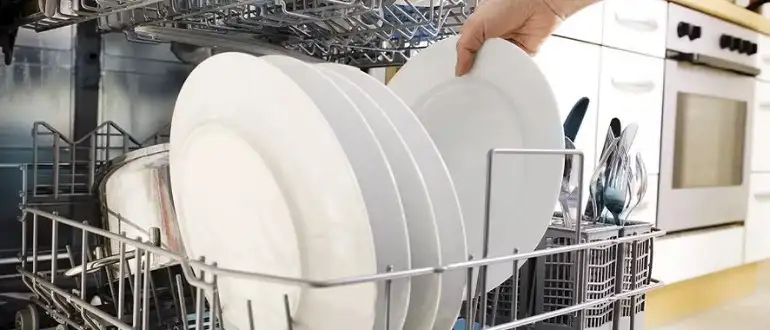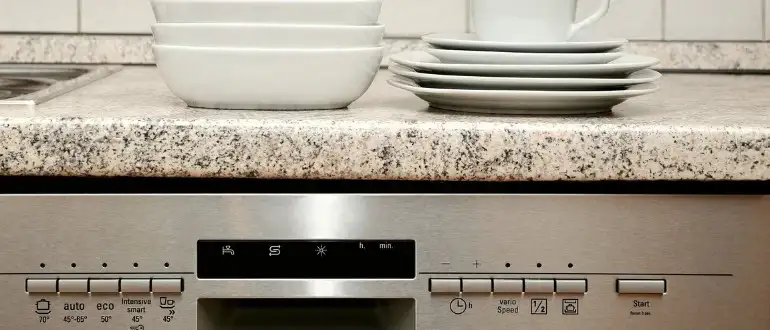Dishwasher 1 Hour Cycle Vs Normal (Unpacking the Myths)
We may earn affiliate fees for purchases using our links (at no additional cost to you).
Explore the comprehensive guide on the distinctions between a dishwasher’s 1-hour cycle and its normal cycle.
Uncover the advantages and limitations of each option to make an informed decision that best suits your dishwashing needs.
Whether you seek quick convenience or thorough cleaning, this guide has you covered.

Dishwasher 1 Hour Cycle Vs Normal
The main difference between a dishwasher’s 1-hour wash and normal cycle lies in the duration and intensity of the cleaning process. The 1-hour wash is quicker and more intense, utilizing more water, energy, and heat, while the normal cycle is longer and gentler, typically running for an hour and a half to three hours.
Cleaning Performance
Edge: Normal Wash (Superior Cleaning Performance)
1-Hour Wash
The 1-hour wash cycle, like that found in the Bosch 300 Series Dishwasher, is designed for quick cleaning.
It may not provide the same level of cleaning performance as the normal wash cycle.
Although effective for handling lightly soiled dishes and urgent cleaning needs, it may not be as thorough in removing tough stains or dried-on food residues.
However, models like the COMFEE’ Countertop Dishwasher feature a 45-minute speed wash cycle that is highly efficient, especially for lightly soiled dishes. This makes it a great option for quick washes when you’re short on time but still require effective cleaning.
Normal Wash
In contrast, the normal wash cycle, as seen in the Whirlpool WDT750SAKZ Dishwasher, offers superior cleaning performance compared to the 1-hour wash.
Its longer duration and more comprehensive cleaning process enable it to tackle a wide range of dishwashing needs, including heavily soiled dishes and stubborn food particles.
The normal wash cycle is the go-to option for achieving a thorough and pristine clean for most types of dishes.
Duration
Edge: 1-Hour Wash
1-Hour Wash
As the name suggests, the 1-hour wash cycle is designed to complete the dishwashing process within a shorter timeframe.
It is ideal for situations when you need clean dishes quickly, such as when you have guests arriving soon or when you need a few essential dishes washed promptly.
Normal Wash
The normal wash cycle typically takes longer to complete compared to the 1-hour wash cycle.
It is designed for regular, everyday use and allows for thorough cleaning of dishes with more time allocated for soaking, washing, and drying.
Water and Energy Consumption
Edge: 1-Hour Wash (Higher Consumption)

1-Hour Wash
Due to its shorter duration, the 1-hour wash cycle tends to consume less water but can use more energy per minute of operation.
It is efficient in terms of water usage but may have a higher energy consumption rate to achieve a faster cleaning process.
Normal Wash
The normal wash cycle, being a longer cycle, may consume more water but is likely to have a lower energy consumption rate per minute.
It may be less time-efficient but could be more energy-efficient for longer cycles.
Pre-Rinsing Requirement
Edge: Both (Minimal Pre-Rinsing)
1-Hour Wash
Both the 1-hour wash and the normal wash cycles typically require minimal pre-rinsing of dishes before loading them into the dishwasher.
Modern dishwashers are designed to handle food residues, and lightly soiled dishes can often be loaded directly into the dishwasher without extensive pre-rinsing.
Normal Wash
Like the 1-hour wash, the normal wash cycle also requires minimal pre-rinsing, making it convenient for users who prefer loading dishes directly into the dishwasher without extensive pre-cleaning.
Eco-friendliness
Edge: Normal Wash (More Eco-friendly)
1-Hour Wash
The 1-hour wash cycle, while efficient in terms of time, may use more energy and water per minute, making it less eco-friendly compared to longer cycles.
Normal Wash
The normal wash cycle, being longer and allowing for more gradual and efficient cleaning, tends to be more eco-friendly as it consumes less energy and water per minute of operation.
Capacity
Edge: Normal Wash (Larger Capacity)
1-Hour Wash
The 1-hour wash cycle is generally designed for smaller loads or urgent cleaning needs. It may have a smaller capacity to ensure quicker cleaning.
Normal Wash
The normal wash cycle, being a longer and more versatile option, is usually designed to accommodate larger loads with a higher capacity, making it suitable for handling the daily dishwashing needs of a typical household.
Noise Level
Edge: Both (Depends on Model and Brand)
1-Hour Wash
The noise level of the 1-hour wash cycle can vary depending on the specific dishwasher model and brand
Some dishwashers are designed to operate quietly, while others may produce more noise during the quicker wash cycle.
Normal Wash
Similar to the 1-hour wash, the noise level of the normal wash cycle depends on the dishwasher’s make and model.
Many modern dishwashers are designed to run quietly, providing a more peaceful cleaning experience.
Soil Sensing Technology
Edge: Normal Wash (More Advanced Options)
1-Hour Wash
The 1-hour wash cycle may not always include soil sensing technology, as its primary focus is on quick cleaning.
Some models might have basic sensors to adjust water usage, but more advanced soil sensing features are often found in longer and more comprehensive cycles.
Normal Wash
The normal wash cycle is more likely to have advanced soil sensing technology, allowing the dishwasher to detect the level of grime on the dishes and adjust the cleaning process accordingly.
This can result in more efficient cleaning and optimized water and energy usage.
Suitable Dishes
Edge: Both (Depends on Soil Level)
1-Hour Wash
The 1-hour wash cycle is suitable for lightly soiled dishes and items that need quick cleaning. It may not be the best choice for heavily soiled or dishes with dried-on food particles.
Normal Wash
The normal wash cycle is suitable for a wide range of dishes, including those with heavier soil or tough, dried-on food residues.
It can handle a more extensive variety of dishwashing needs compared to the 1-hour wash.
Energy Star Rating
Edge: Both (Depends on Model and Brand)
1-Hour Wash

The Energy Star rating of the 1-hour wash cycle depends on the dishwasher model and brand.
Some models may have higher energy efficiency ratings, while others might consume more energy due to the faster operation.
Normal Wash
Similar to the 1-hour wash, the Energy Star rating of the normal wash cycle varies based on the dishwasher’s make and model.
Many modern dishwashers, including those with normal wash cycles, are designed to meet energy-efficient standards.
Sure, here’s the list of advantages and disadvantages of Dishwasher 1 Hour Cycle and Normal Cycle in markdown format:
Advantages of Dishwasher 1 Hour Cycle:
- Faster cleaning time, suitable for smaller loads or urgent cleaning needs.
- Saves energy and water compared to longer cycles, making it more environmentally friendly.
- Ideal for lightly soiled dishes, reducing the need for extensive washing.
- Convenient for busy households or when there’s a time constraint.
Disadvantages of Dishwasher 1 Hour Cycle:
- Might not provide thorough cleaning for heavily soiled or greasy dishes.
- Limited capacity, may not be suitable for larger loads or heavily stacked dishes.
- Increased risk of residual food particles or stains remaining on dishes.
- The shorter cycle might not effectively sanitize dishes, especially in cases of illness or during a pandemic.
Advantages of Dishwasher Normal Cycle:
- Offers a longer and more thorough cleaning process, suitable for heavily soiled dishes.
- Provides better sanitization, effectively killing bacteria and germs on dishes.
- Larger capacity, can accommodate more dishes in a single cycle.
- Better at removing stubborn stains and dried-on food particles.
Disadvantages of Dishwasher Normal Cycle:
- Longer cleaning time and higher energy and water consumption compared to the 1-hour cycle.
- Not as suitable for urgent cleaning needs or smaller loads.
- May cause a delay in having clean dishes available for use.
- Inefficient for lightly soiled dishes, leading to unnecessary energy and water usage.
Which Cycle Is Better: 1-Hour Wash Vs Normal?

The choice between a 1-hour wash cycle and a normal cycle depends on the specific needs and circumstances.
The 1-hour wash cycle is advantageous for its speed, energy efficiency, and convenience, making it suitable for lightly soiled dishes and urgent cleaning requirements.
However, it may not provide thorough cleaning for heavily soiled dishes or sanitize effectively in certain situations.
On the other hand, the normal cycle offers a longer and more comprehensive cleaning process, ideal for heavily soiled dishes, better sanitization, and larger loads.
While it consumes more energy and time, it ensures better results in removing stubborn stains and dried-on food particles.
Ultimately, if time is of the essence and the dishes are not heavily soiled, the 1-hour wash cycle can be a good choice. For heavily soiled dishes or better sanitization, the normal cycle is the better option.
Consider individual needs and the level of cleanliness required to make the most suitable choice.
Final words
In this dishwasher 1-hour wash vs normal wash cycle debating guide, we have delivered all the essential information you are looking for. But the fact is, it’s not all about knowing which cycle is better than the other.
Instead, you must know why to run which cycle and what you’ll get from a certain wash cycle.
When it comes to 1-hour wash and normal wash cycle, consider the condition of your dishes and your serving needs to pick the right cycle.